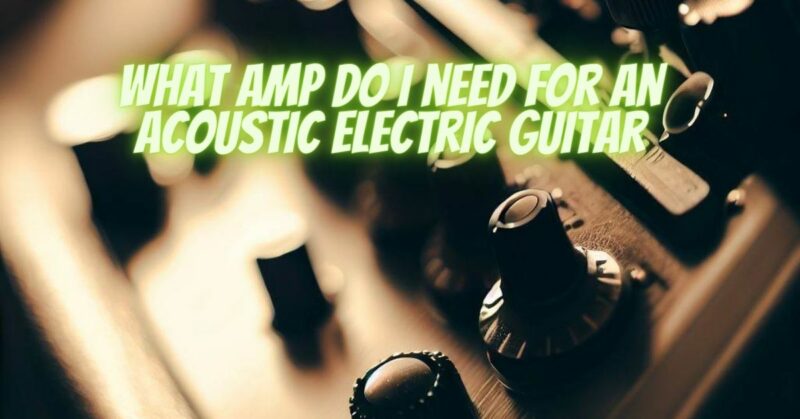Acoustic-electric guitars offer a versatile musical experience, seamlessly blending the acoustic richness of traditional guitars with the amplified potential of electric guitars. To fully harness the sonic capabilities of your acoustic-electric guitar, selecting the right amplifier is crucial. In this article, we will explore the considerations and factors that come into play when choosing the perfect amplifier to complement your acoustic-electric guitar.
Understanding Acoustic-Electric Guitars
Acoustic-electric guitars are designed with built-in pickups and preamp systems, allowing you to amplify and shape the natural sound of your acoustic guitar. These pickups translate the vibrations of the strings into electrical signals, which can then be routed to an amplifier for enhanced projection and tonal control.
Amplifier Types for Acoustic-Electric Guitars
When choosing an amplifier for your acoustic-electric guitar, there are two main types to consider: acoustic amplifiers and acoustic-electric guitar amplifiers.
Acoustic Amplifiers: These are designed to accurately reproduce the natural tones of acoustic instruments, offering a clean and transparent sound. They often include features like EQ controls, feedback suppression, and effects tailored to acoustic instruments. Acoustic amplifiers are ideal if you want to retain the acoustic qualities of your guitar’s sound.
Acoustic-Electric Guitar Amplifiers: These amplifiers are specifically engineered to cater to the unique tonal characteristics of acoustic-electric guitars. They combine the clean and transparent sound of acoustic amplifiers with features found in electric guitar amplifiers, such as onboard effects and distortion. These amps strike a balance between enhancing your guitar’s acoustic tones and providing some tonal versatility.
Considerations When Choosing an Amp
- Tonal Preference: Determine whether you want to prioritize the natural, unamplified sound of your acoustic guitar or if you’re open to experimenting with effects and tonal shaping.
- Venue and Application: Consider where you’ll be playing most often. If you’re performing in small venues or at home, a compact amplifier might suffice. For larger stages or outdoor gigs, you’ll need an amplifier with sufficient power to project your sound effectively.
- Effects and Features: Some acoustic-electric guitar amplifiers come with built-in effects like reverb, chorus, and delay. If you enjoy experimenting with effects, look for an amplifier that offers these options.
- Portability: If you’re frequently on the move, portability becomes a crucial factor. Look for lightweight and compact amplifiers that are easy to transport.
- Inputs and Outputs: Check if the amplifier has multiple input channels for connecting other instruments or microphones. Also, consider whether it has line outputs for connecting to a larger sound system.
Finding the Perfect Match
To find the ideal amplifier for your acoustic-electric guitar, it’s essential to audition different options. Bring your guitar to a music store and test various amplifiers to assess how they complement your guitar’s natural sound and suit your playing style. Pay attention to factors like tonal clarity, responsiveness, and the ease of use for any onboard controls and effects.
Selecting the right amplifier for your acoustic-electric guitar involves understanding your tonal preferences, performance needs, and the features that matter most to you. Whether you opt for an acoustic amplifier to retain the natural acoustic qualities or an acoustic-electric guitar amplifier for added versatility, finding the perfect match will enhance your playing experience and allow you to showcase the unique sonic blend that acoustic-electric guitars offer.


